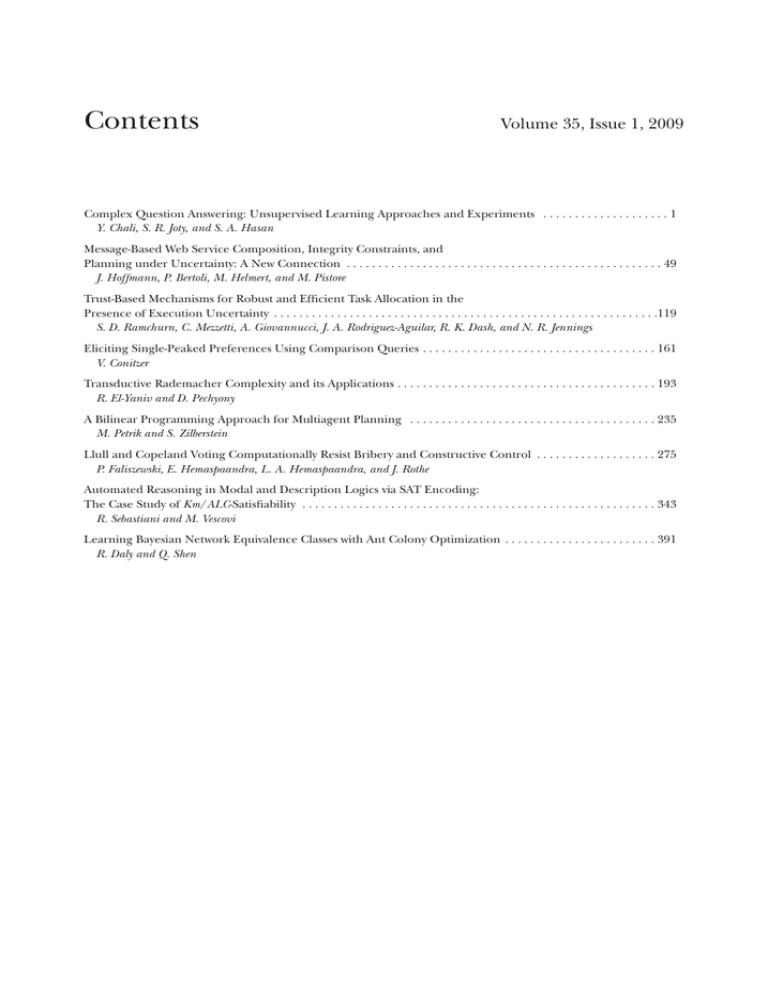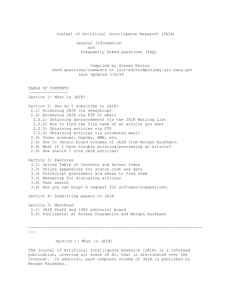
Contents
Volume 35, Issue 1, 2009
Complex Question Answering: Unsupervised Learning Approaches and Experiments . . . . . . . . . . . . . . . . . . . . 1
Y. Chali, S. R. Joty, and S. A. Hasan
Message-Based Web Service Composition, Integrity Constraints, and
Planning under Uncertainty: A New Connection . . . . . . . . . . . . . . . . . . . . . . . . . . . . . . . . . . . . . . . . . . . . . . . . . . 49
J. Hoffmann, P. Bertoli, M. Helmert, and M. Pistore
Trust-Based Mechanisms for Robust and Efficient Task Allocation in the
Presence of Execution Uncertainty . . . . . . . . . . . . . . . . . . . . . . . . . . . . . . . . . . . . . . . . . . . . . . . . . . . . . . . . . . . . .119
S. D. Ramchurn, C. Mezzetti, A. Giovannucci, J. A. Rodriguez-Aguilar, R. K. Dash, and N. R. Jennings
Eliciting Single-Peaked Preferences Using Comparison Queries . . . . . . . . . . . . . . . . . . . . . . . . . . . . . . . . . . . . . 161
V. Conitzer
Transductive Rademacher Complexity and its Applications . . . . . . . . . . . . . . . . . . . . . . . . . . . . . . . . . . . . . . . . . 193
R. El-Yaniv and D. Pechyony
A Bilinear Programming Approach for Multiagent Planning . . . . . . . . . . . . . . . . . . . . . . . . . . . . . . . . . . . . . . . 235
M. Petrik and S. Zilberstein
Llull and Copeland Voting Computationally Resist Bribery and Constructive Control . . . . . . . . . . . . . . . . . . . 275
P. Faliszewski, E. Hemaspaandra, L. A. Hemaspaandra, and J. Rothe
Automated Reasoning in Modal and Description Logics via SAT Encoding:
The Case Study of Km/ALC-Satisfiability . . . . . . . . . . . . . . . . . . . . . . . . . . . . . . . . . . . . . . . . . . . . . . . . . . . . . . . . 343
R. Sebastiani and M. Vescovi
Learning Bayesian Network Equivalence Classes with Ant Colony Optimization . . . . . . . . . . . . . . . . . . . . . . . . 391
R. Daly and Q. Shen
J ournal of Artificial Intelligence Research
AN INTERNATIONAL ELECTRONIC AND PRINT JOURNAL
Editors and Staff, 2009
Editor-in-Chief
Adnan Darwiche
Associate Editor-in-Chief
Shlomo Zilberstein
Associate Editors
Chitta Baral
Regina Barzilay
Christian Bessiere
Ronen Brafman
Gerhard Brewka
Vincent Conitzer
Giuseppe De Giacomo
Dieter Fox
Hector Geffner
Lise Getoor
Joerg Hoffman
Adele Howe
Thorsten Joachims
Jerome Lang
Lillian Lee
Kevin Leyton-Brown
Shaul Markovitch
Chris Meek
Pedro Meseguer
Andrew Ng
Dragomir Radev
Jeff Rosenschein
Sylvie Thiebaux
Gerard Verfaillie
Michael Wooldridge
Editorial Board
Blai Bonet
David Blei
Yiling Chen
Yixin Chen
Xiaoping Chen
David Chiang
Alessandro Cimatti
Minh Dinh Do
Prashant Doshi
Stefan Edelkamp
Edith Elkind
Alan Fern
Amir Globerson
Judy Goldsmith
Eric Hansen
Patrik Haslum
Malte Helmert
Holger Hoos
Manfred Jaeger
Kristian Kersting
Dan Klein
Javier Larrosa
Kathryn Laskey
Felip Manya
Lluis Marquez
Pierre Marquis
Hwee Tou Ng
Ilkka Niemela
Bo Pang
Simon Parsons
Joelle Pineau
Pascal Poupart
Ariel Procaccia
Daniel Reeves
Riccardo Rosati
Wheeler Ruml
Ashish Sabharwal
Lakhdar Sais
Torsten Schaub
Christian Shelton
Tobias Scheffer
Thomas Schiex
Ben Taskar
Kristen Venable
Kiri Wagstaff
Neil Yorke-Smith
Jia-Huai You
Advisory Board
Fahiem Bacchus
Peter Bartlett
Walter Daelemans
Rina Dechter
Luc De Raedt
Oren Etzioni
Boi Faltings
Maria Fox
Russell Greiner
Subbarao Kambhampati
Sven Koenig
Gerhard Lakemeyer
Paolo Liberatore
Fangzhen Lin
Daniel Marcu
Steven Minton
Martha Pollack
Francesca Rossi
Diana Spears
Milind Tambe
Moshe Tennenholtz
Michael Wellman
Makoto Yokoo
Nevin Zhang
Toby Walsh
Dan Weld
Managing Editor
Steven Minton
Special Projects
Toby Walsh
Production Supervisor
Lillian Bluestein
About JAIR
Subscriptions
JAIR's editorial board is dedicated to the rapid dissemination of important
research results to the global AI community. The journal's scope encompasses all areas of artificial intelligence, including automated reasoning,
cognitive modeling, knowledge representation, learning, natural language,
neural networks, perception, and robotics. For information regarding submissions, AI Access Foundation, or the JAIR editorial charter, please see
jair.org
JAIR (ISSN 1076-975) is published three times a year by the Association for
the Advancement of Artificial Intelligence (AAAI), 445 Burgess Drive,
Menlo Park, CA 94025-3442, telephone (650) 328-3123. Members of AAAI
receive a discount on JAIR subscriptions. The JAIR subscription price is
$85.00 per volume or issue. Inquiries regarding membership in the AAAI
should be sent to the AAAI at the above address.
Microfilm, Back, or Replacement Copies
Back issues of JAIR (from volume 18 onward) are available from the Association for the Advancement of Artificial Intelligence. Send requests to
AAAI, 445 Burgess Drive, Menlo Park, California 94025. Microform copies
are available from ProQuest Information and Learning, 300 North Zeeb
Road, Ann Arbor, MI 48106. Telephone (800) 521-3044 or (734) 761-4700.
Copying Articles for Personal Use
Authorization to photocopy items for internal or personal use, or the internal or personal use of specific clients, or for educational classroom use,
is granted by AI Access Foundation. This consent does not extend to other
kinds of copying, such as for general distribution, resale, advertising, or for
creating new collective works. Please contact AAAI for such permission.
Address Change
Please notify AAAI eight weeks in advance of a change of address. Send old
label with new address to AAAI, 445 Burgess Drive, Suite 100, Menlo Park,
CA 94025-3442.
Periodicals Postage paid at Menlo Park, CA and additional mailing offices.
Postmaster: Change Service Requested. Send address changes to AAAI,
445 Burgess Drive, Suite 100, Menlo Park, CA 94025-3442.
Copyright © 2009, 2010 by AI Access Foundation and the Association for
the Advancement of Artificial Intelligence. All rights reserved. No part of
this publication may be reproduced in whole or in part without prior written permission. Unless otherwise stated, the views expressed in published
material are those of the authors and do not necessarily reflect the policies
or opinions of JAIR, its editors and staff, AI Access Foundation, or the Association for the Advancement of Artificial Intelligence.
ISBN 978-1-57735-475-8












